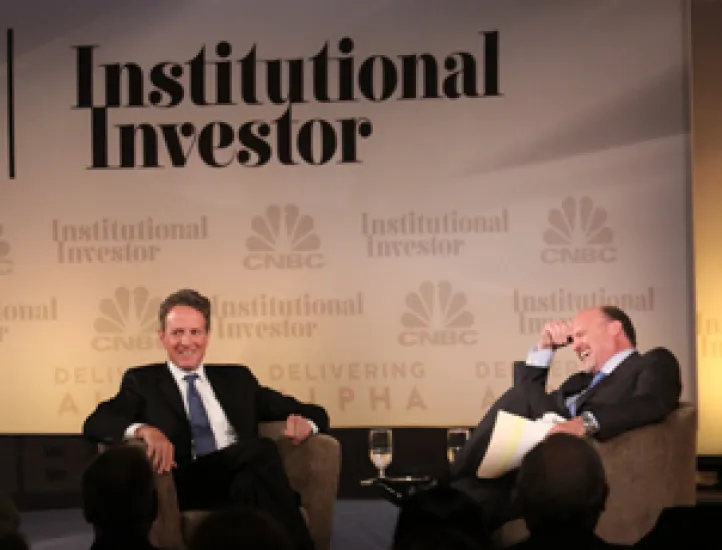Treasury secretary Tim Geithner’s lively interview with Jim Cramer and Bill Ackman’s long-winded case for going long the Hong Kong dollar may have grabbed the biggest headlines from the II/CNBC Delivering Alpha conference on Wednesday.
However, what struck me most after listening to three dozen blue chip speakers over nearly 10 hours was how little bearishness I heard. I had thought they would echo the comments many hedge fund managers offer in private, not-for-attribution-discussions: Little strong conviction about the future, very cautious, not doing much except buying their favorite stocks and other investments when they go down.
Sure, a number of speakers are concerned about the frightening impasse over resolving the debt crisis in Europe. Marathon Asset Management co-founder Bruce Richards not only predicted that Greece would default, but that Portugal and others would follow shortly afterward. And Kyle Bass of Hayman Advisors for the umpteenth time at a conference trotted out his trusty slides illustrating why Japan is a ticking time bomb while the short-selling specialist made his case for why China is one big bubble.
Otherwise, many of the speakers were downright bullish on equities in general. “Stocks are cheap,” Ackman said standing by a back row before his “blockbuster” lunch announcement.
Others said stocks looked attractive if for no other reason than in comparison to other investments: Cash is paying virtually no interest while 10-year Treasuries are only yielding 2 percent, making it nearly impossible for pension funds to meet future obligations.
GLG co-founder Pierre LaGrange, for example, talked up European stocks in general, asserting, “There are absolute values I haven’t seen before.” Speaking on the same panel, Laurence Fink, chairman and chief executive officer of BlackRock added: “The amount of money short in Europe is extraordinary.”
Several managers made similar judgments about valuations in the U.S. Yes, Omega Advisors’ Leon Cooperman did tell us a group of 14 portfolio managers he regularly has had lunch with for many years are 30 percent to 40 percent below their typical exposure. But, then he went on to make the case for U.S. stocks ending the year higher.
However, this bullish outlook came with a few conditions — that there is no recession in the U.S. in 2011 or 2012; that the European Central Bank “steps up and does for foreign financial institutions what the U.S. did” several years ago; that President Obama softens his anti-business anti-wealth crusade; and that the democracy movements in the Middle East prevents the price of oil from soaring out of control. “We’re all prisoners of 2008,” Cooperman reminded his audience, asserting there are no real buyers of equities and that pension funds still seem more interested in fixed-income despite the anemic level of interest rates. Yet, he pointed out that 50 percent of stocks now yield more than bonds.
Asked to single out one stocks, he mentioned three—Boston Scientific, Sallie Mae and Apple.
Earlier, Meredith Whitney said of asset managers: “The valuations of asset managers today are at a level I never thought I’d experience in my life time.” Wow. A positive word from the bank bear.
Fink, meanwhile told the audience that while the price of gold has surged in price, gold stocks have not kept pace. “There are imbalances in the investing world,” he said. “Investors are running away from equities.” He also recommended dividend stocks in general and noted there are some credit opportunities in Europe.
In fact, in one of a number of electronic audience polls, the largest group (32 percent) predicted the S&P 500 would be substantially (more than 10 percent) higher a year from now while another 28 percent said it would be slightly higher. Just 25 percent said it would be slightly or substantially lower.
In a separate poll, 57 percent said U.S. equities, especially large cap multi-nationals, are the one best Buy and Hold investment for the next decade, easily outscoring emerging markets in general and developed markets outside the U.S.
Other presenters singled out investments not usually found on the radar, like so-called frontier markets, such as Qatar and Bangladesh talked up by long-time value sleuth Martin Whitman; shopping mall REITs (Ackman) and levered credit (Anne Popkin of Symphony Asset Management).
Maybe it really isn’t 2008 all over again.






